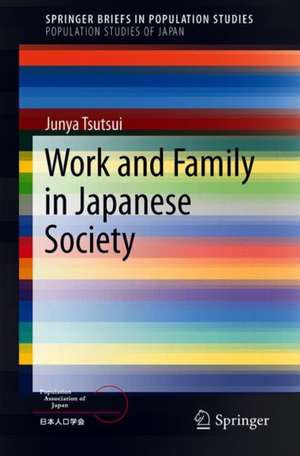Work and Family in Japanese Society: SpringerBriefs in Population Studies
Autor Junya Tsutsuien Limba Engleză Paperback – 11 dec 2019
Further to this rather common explanation, which could also be applied to other low-fertility societies such as Germany and Italy, the author presents an original view. Japan has had its own momentum in holding on to its strong “men as breadwinners and women as housekeepers” model by creating a unique regime, namely, a Japanese model of a welfare society. This regime places special emphasis on the welfare provided by private companies and family members instead of by the government. Private firms are expected to secure men’s jobs and income to the greatest extent, taking advantage of Japanese employment customs. On the other hand, women are expected to provide care for their family members. The book argues that the familialist orientation is still dominant in Japan and is repeatedly reinforced in the policy context.
Din seria SpringerBriefs in Population Studies
-
 Preț: 344.90 lei
Preț: 344.90 lei -
 Preț: 177.49 lei
Preț: 177.49 lei -
 Preț: 355.54 lei
Preț: 355.54 lei -
 Preț: 317.11 lei
Preț: 317.11 lei -
 Preț: 442.62 lei
Preț: 442.62 lei - 15%
 Preț: 463.03 lei
Preț: 463.03 lei - 15%
 Preț: 463.68 lei
Preț: 463.68 lei -
 Preț: 377.57 lei
Preț: 377.57 lei -
 Preț: 414.42 lei
Preț: 414.42 lei -
 Preț: 476.57 lei
Preț: 476.57 lei -
 Preț: 376.80 lei
Preț: 376.80 lei -
 Preț: 376.22 lei
Preț: 376.22 lei -
 Preț: 377.73 lei
Preț: 377.73 lei -
 Preț: 477.17 lei
Preț: 477.17 lei -
 Preț: 379.09 lei
Preț: 379.09 lei -
 Preț: 346.66 lei
Preț: 346.66 lei -
 Preț: 380.07 lei
Preț: 380.07 lei -
 Preț: 343.88 lei
Preț: 343.88 lei -
 Preț: 374.46 lei
Preț: 374.46 lei -
 Preț: 343.39 lei
Preț: 343.39 lei -
 Preț: 205.29 lei
Preț: 205.29 lei -
 Preț: 378.92 lei
Preț: 378.92 lei -
 Preț: 375.23 lei
Preț: 375.23 lei -
 Preț: 378.34 lei
Preț: 378.34 lei -
 Preț: 476.42 lei
Preț: 476.42 lei -
 Preț: 379.09 lei
Preț: 379.09 lei -
 Preț: 476.79 lei
Preț: 476.79 lei -
 Preț: 441.85 lei
Preț: 441.85 lei - 15%
 Preț: 461.73 lei
Preț: 461.73 lei -
 Preț: 375.23 lei
Preț: 375.23 lei -
 Preț: 259.96 lei
Preț: 259.96 lei -
 Preț: 343.88 lei
Preț: 343.88 lei -
 Preț: 442.62 lei
Preț: 442.62 lei -
 Preț: 474.67 lei
Preț: 474.67 lei -
 Preț: 443.75 lei
Preț: 443.75 lei -
 Preț: 443.00 lei
Preț: 443.00 lei -
 Preț: 262.09 lei
Preț: 262.09 lei -
 Preț: 376.80 lei
Preț: 376.80 lei -
 Preț: 377.18 lei
Preț: 377.18 lei -
 Preț: 311.91 lei
Preț: 311.91 lei -
 Preț: 376.59 lei
Preț: 376.59 lei -
 Preț: 174.62 lei
Preț: 174.62 lei -
 Preț: 379.09 lei
Preț: 379.09 lei -
 Preț: 477.72 lei
Preț: 477.72 lei -
 Preț: 340.45 lei
Preț: 340.45 lei -
 Preț: 374.85 lei
Preț: 374.85 lei -
 Preț: 475.22 lei
Preț: 475.22 lei
Preț: 474.84 lei
Nou
Puncte Express: 712
Preț estimativ în valută:
90.89€ • 98.76$ • 76.40£
90.89€ • 98.76$ • 76.40£
Carte tipărită la comandă
Livrare economică 21 aprilie-05 mai
Preluare comenzi: 021 569.72.76
Specificații
ISBN-13: 9789811324956
ISBN-10: 9811324956
Pagini: 90
Ilustrații: VIII, 61 p. 19 illus., 1 illus. in color.
Dimensiuni: 155 x 235 x 11 mm
Greutate: 0.11 kg
Ediția:1st ed. 2020
Editura: Springer Nature Singapore
Colecția Springer
Seriile SpringerBriefs in Population Studies, Population Studies of Japan
Locul publicării:Singapore, Singapore
ISBN-10: 9811324956
Pagini: 90
Ilustrații: VIII, 61 p. 19 illus., 1 illus. in color.
Dimensiuni: 155 x 235 x 11 mm
Greutate: 0.11 kg
Ediția:1st ed. 2020
Editura: Springer Nature Singapore
Colecția Springer
Seriile SpringerBriefs in Population Studies, Population Studies of Japan
Locul publicării:Singapore, Singapore
Cuprins
Introduction: Current Conditions of Work and Family in Japan.- 1 The Factors of Fertility Decline in Japan.- 2 The Japanese Working Custom and Women’s Employment Participation.- 3 Work and Family in Japan from the Comparative Perspective.- 4 Family Formation and Disparity.- 5 The Re-familiarization in Japan and its Consequences.- Epilogue: Beyond a Divided Society.- References.
Notă biografică
Junya Tsutsui, College of Social Sciences, Ritsumeikan University
Caracteristici
Situates the low birthrate phenomenon in Japan in the broader context of working conditions and family formation Captures the characteristics of Japanese society from the comparative perspective of welfare regime theory and links this argument with the low-fertility problem Approaches the current trend in family policies as re-familialization and discusses its consequences
